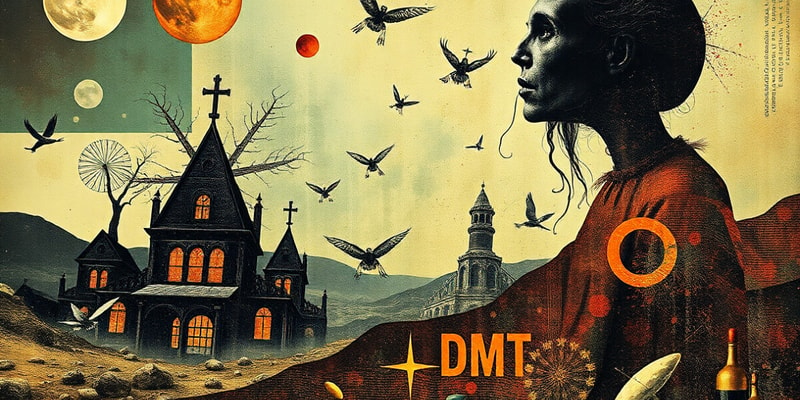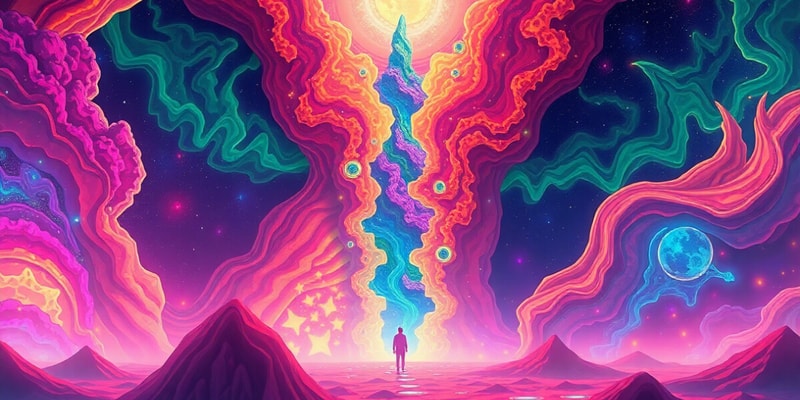Podcast
Questions and Answers
Hallucinogens cause physical addiction in users.
Hallucinogens cause physical addiction in users.
False
Albert Hofmann synthesized LSD in 1948.
Albert Hofmann synthesized LSD in 1948.
False
Psychedelic hallucinogens enhance the brain's selection process for perceiving surroundings.
Psychedelic hallucinogens enhance the brain's selection process for perceiving surroundings.
False
PCP is classified as a hallucinogen.
PCP is classified as a hallucinogen.
Signup and view all the answers
Entactogens are known to evoke emotional openness and relatedness.
Entactogens are known to evoke emotional openness and relatedness.
Signup and view all the answers
Marijuana is not considered a hallucinogen.
Marijuana is not considered a hallucinogen.
Signup and view all the answers
Hallucinogens have been utilized for religious reasons by ancient cultures.
Hallucinogens have been utilized for religious reasons by ancient cultures.
Signup and view all the answers
The effect of hallucinogens can lead to visual distortion and hallucinations.
The effect of hallucinogens can lead to visual distortion and hallucinations.
Signup and view all the answers
Study Notes
Hallucinogens
- Hallucinogens, also known as psychedelic drugs, alter perception of sights, sounds, thoughts, and feelings.
- They cause distorted imaginations, hallucinations, and visual distortions.
- Hallucinogens do not cause addiction, however, a person can become addicted to the effects.
- Hallucinogens have been used for medicinal and religious purposes throughout history, and some cultures still use them today.
- Examples include LSD, Ketamine, PCP, Marijuana, mescaline, psilocybin, and anticholinergics (from jimson weed).
Types of Psychoactive Drugs
- Hallucinogens
- Stimulants
- Depressants
- Opiates & Opioids
Lecture Objectives
- Define hallucinogens and list examples.
- Explain different classes of hallucinogens.
- Explain the physiological effects of hallucinogens.
How Hallucinogens are Taken
- Swallowed (pills, drinks).
- Smoked.
- On the tongue (blotter acid).
- Injected (intravenously or intramuscularly).
Subclasses of Hallucinogens
- Psychedelics
- Entactogens
- Dissociatives
- Atypical
Psychedelics
- Under normal conditions, the brain filters out certain aspects of the environment.
- Psychedelic hallucinogens remove this filtering process, causing users to experience everything intensely.
- Common effects include expanded senses (colors, sounds, smells, textures).
- Visual and auditory hallucinations are common.
- Examples: LSD, psilocybin, mescaline, DMT.
Entactogens
- Produce emotional experiences of communion, oneness, relatedness, and emotional openness.
- May have therapeutic benefits for post-traumatic stress disorder and anxiety.
- Example: MDMA.
Dissociatives
- Affect the brain's ability to process sensory input.
- Create a state of sensory deprivation.
- User may feel detached from their surroundings.
- Users may experience "out-of-body" sensations.
- Examples: Ketamine, DXM, nitrous oxide.
Atypical Hallucinogens
- Unrelated substances with diverse mechanisms of action.
- Varying legal statuses.
- Some have therapeutic potential.
- Potential uses include treating addiction or other medical conditions.
- Examples include ibogaine, salvinorin A, THC (tetrahydrocannabinol).
Harmful Effects of Hallucinogens
- Physical: Flashbacks, increased energy, rapid heart rate, nausea.
- Emotional: Mood swings, panic attacks, loss of senses, depression.
Mixing Hallucinogens with Other Drugs
- Mixing hallucinogens with stimulants can cause extreme stress on the body.
- Mixing hallucinogens with alcohol can reduce coordination and increase the chance of vomiting.
Studying That Suits You
Use AI to generate personalized quizzes and flashcards to suit your learning preferences.
Related Documents
Description
This quiz explores hallucinogens, a class of psychoactive drugs that alter perception and can lead to hallucinations. It covers their definitions, examples, methods of consumption, and insights into their physiological effects. Additionally, learn about various subclasses and the different classes of psychoactive drugs.



